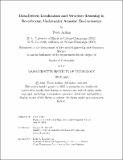Data-Driven Localization and Structure Learning in Reverberant Underwater Acoustic Environments
Author(s)
Arikan, Toros
DownloadThesis PDF (24.63Mb)
Advisor
Wornell, Gregory W.
Terms of use
Metadata
Show full item recordAbstract
Passive localization and tracking of a mobile emitter, and the joint learning of its reverberant 3D environment, are important yet challenging tasks in the shallow-water underwater acoustic setting. A typical application is the monitoring of submarines or other man-made emitters with a small, surreptitiously-deployed receiver array. This task can be rendered more difficult by obstacles such as seamounts or piers, which can occlude the line of sight from the emitter to the receivers. Furthermore, the underwater acoustic domain is complex and difficult to model, and a good signal-to-noise ratio is not assured. We view these complexities as features that can be leveraged for improved localization performance, using global optimization and neural network methods. We develop a multi-stage optimization and tracking architecture that precisely maps the reflective boundaries in the environment, and thereby uses the nonline of sight reflected arrivals for robust and accurate localization. Each stage of this architecture establishes domain knowledge such as synchronization and occluder estimation, which are inputs for the following stages of more refined algorithms. Within this framework, we introduce a 2D neural network boundary estimation method that outperforms the existing methods in the literature, and is robust to the large time delay estimation errors that are common in the application domain. We analyze the performance and reliability of this holistic framework, both in simulation and in reallife reverberant watertank testbeds that model the shallow-water underwater acoustic setting. The results are encouraging for the future development of better-performing localization methods with novel capabilities, using data-driven learning algorithms.
Date issued
2023-06Department
Massachusetts Institute of Technology. Department of Electrical Engineering and Computer SciencePublisher
Massachusetts Institute of Technology